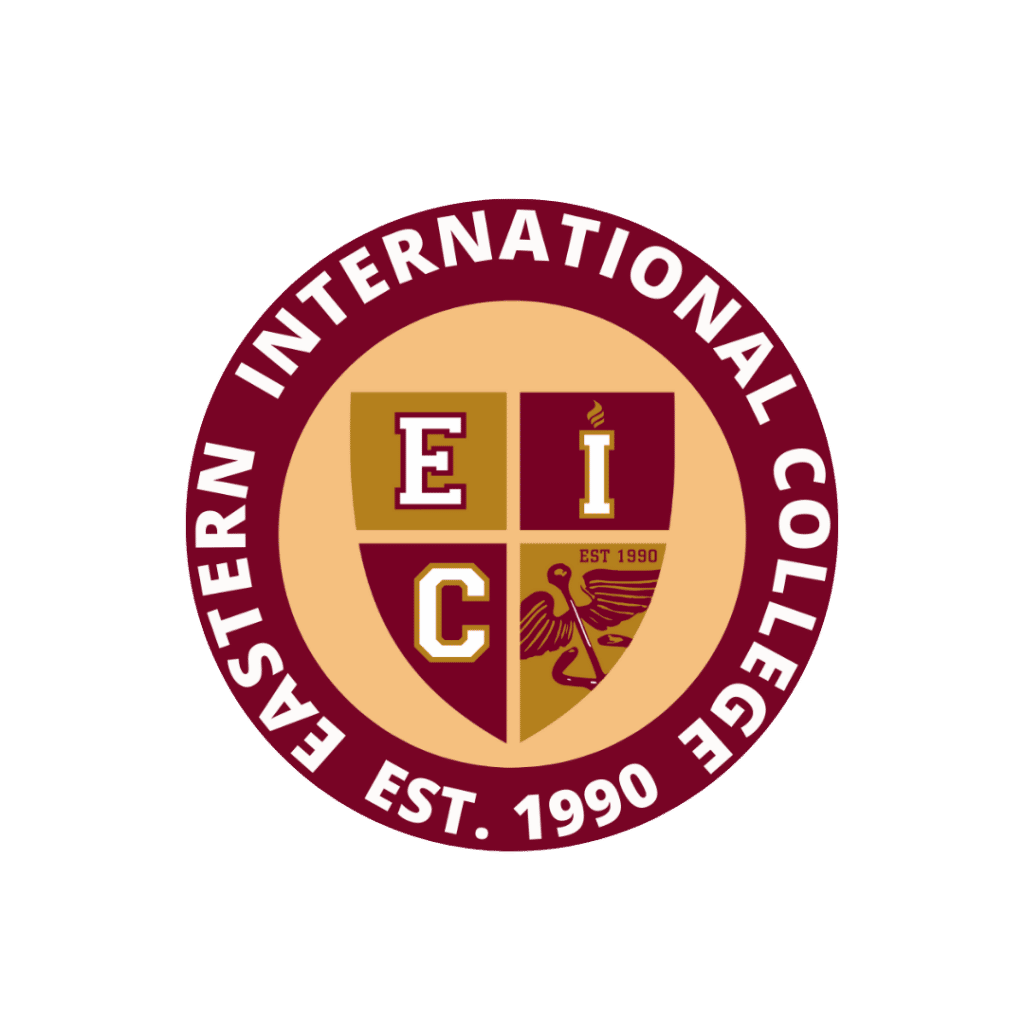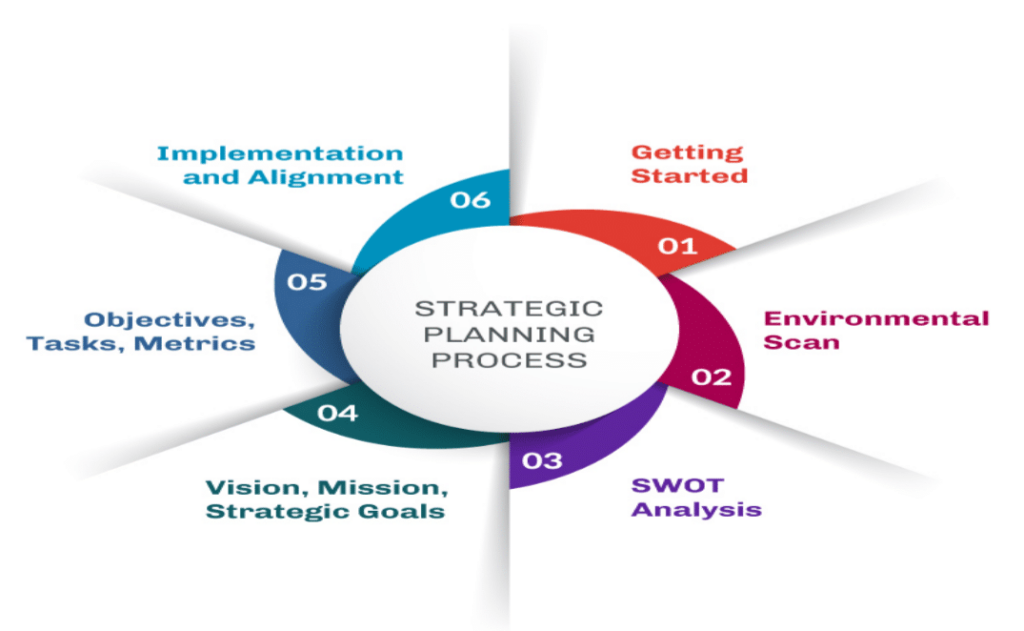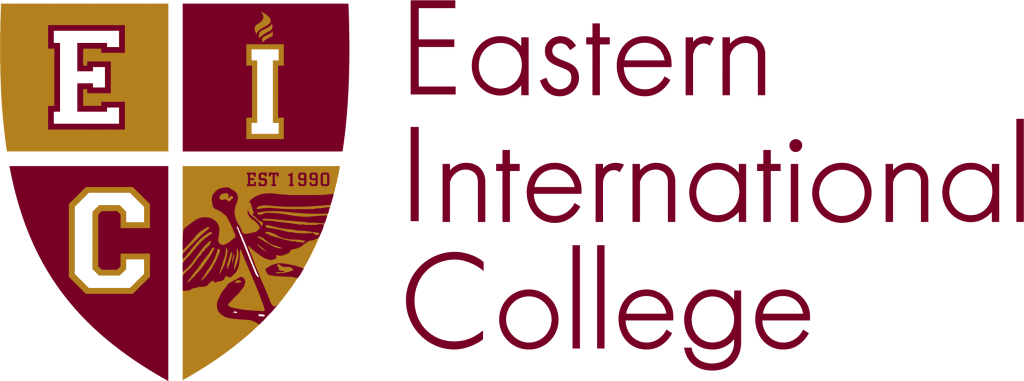
EIC Strategic Planning
Born out of resilience and optimism during the last 30 years, EIC 2027 provides a thoughtful and ambitious roadmap for the strategic direction of the college over the next five years. It is a plan which defines EIC and sets it apart as a catalytic institution and a regional engine of inclusive excellence and upward mobility in the healthcare industry.
The plan builds on the successful work of faculty and staff in producing a diverse pipeline of leaders and changes agents who are committed to social justice, dedicated to igniting new possibilities, and confident about finding innovative solutions to the challenges and opportunities in the region and beyond. It also builds on the importance of both active and applied learning centered in allied healthcare. EIC 2027 focuses on strengthening the college’s long-term health and enhancing its visibility as one of the region’s most innovative allied health colleges.
The Office of Assessment and Institutional Effectiveness (OAIE), along with the Strategic Plan Coordinating Committee, are responsible for reporting the progress of EIC toward its strategic goals. Campus strategic plans serve not only as a roadmap for individual programs but are also part of a coherent plan for the entire EIC system as a whole.
The OAIE has always played a key role in the development and implementation of strategic plans at EIC College. As part of its mission, OAIE is responsible for:
- facilitating and coordinating strategic planning activities on campus
- ensuring that the college’s strategic plan is regularly updated and that its
recommendations are put into action - tracking the progress of plans
- producing appropriate reports
- developing appropriate college processes to ensure that operational and tactical plans
are developed in light of strategic objectives


EIC Strategic Priorities
This Strategic Plan is based on recognizing the gap between the vision we aspire to and where we are now. It serves as a guide that explains what EIC hopes to achieve in the five-year operational cycle. An annual action plan sets priorities, establishes what actions will be undertaken, indicates who is responsible, and reports progress at the year’s end.
Priority 1: Enhance Academic Excellence and Student Success
Priority 2: Strengthen Fiscal Responsibility and Administrative Effectiveness
Priority 3: Expand Degree Offerings and Sustain Programmatic and Institutional Accreditations
Priority 4: Improve Facilities and Resources
The Strategic Planning Process
The development of the Eastern International College Strategic Plan was a comprehensive and inclusive
process. All constituencies of the College were invited to participate in the development of the plan. The
planning process involved:
- Analyzing the current situation – review the vision, mission, philosophy, history, values, assets, and external environment, such as a change in the economy or shifting job market.
- Identifying and setting strategic goals.
- Developing objectives to achieve institutional goals.
- Engaging stakeholders in the process.
- Planning for sustainability and funding.
- Implementing action plans, goals, and objectives.
- Evaluating progress and revising quarterly and/or annually.
- The EIC Steering Committee was established with the following goals and objectives:
- To ensure institutional-wide participation in EIC's strategic direction, planning, and pursuit of regional accreditation.
- To provide a management system for data gathering and sharing throughout the organization regarding planning and accreditation.
- To complete the Strategic Plan and proceed through the regional accreditation process using information and insights from the EIC department leaders.
- To provide the template for compliance with the MSCHE Standards of Excellence and continuous institutional improvement.
- To improve the overall communication and process management at EIC.
- The process was led by Steering Committee, which includes the faculty, staff, and administration.
Goals, Objectives, and Related Strategies
- Goal One: Exceeding Mission and Academic Excellence
| OBJECTIVES: | Objective 1.1. Complete the Self-Study Report for the Dental Hygiene re-accreditation by CODA. |
|---|
| Objective 1.2. Complete the Self-Study Report for the Nursing (ADN) re-accreditation by ACEN. |
| Objective 1.3. Submit a Program Announcement for the Bachelor of Science in Health Informatics and apply for exceeding programmatic mission to the Office of the Secretary of Higher Education (OSHE). |
| Objective 1.4. Obtain approval of the Bachelor of Science in Health Informatics by OSHE. |
| Objective 1.5. Start the first cohort for the BS in Health Informatics in Fall semester 2023 |
| Objective 1.6. Review and initiate improvements on institutional policies in compliance with State, accreditation, and federal standards and guidelines. |
| Objective 1.7. Submit a Program Announcement for BS in Applied Health Sciences and BS in Applied Health Sciences major in Imaging Technology (Completion Program). |
| Objective 1.8. Obtain re-accreditation for ACEN and CODA |
| Objective 1.9. Submit a Program Announcement for the Bachelor of Science in Data Science. |
| Objective 1.10. Inform the Academic Issues Committee (AIC) of the New Jersey President’s Council (NJPC) of the ESL Certificate Program. |
| Objective 1.11. Submit a Substantive Change Application to MSCHE for the ESL Program. |
| Objective 1.12. Submit the application to ACEN for the Bachelor of Science in Nursing Generic Program. |
| Objective 1.13. Explore post-bachelor degree offerings and current trends; form committees, market needs analysis, budget plans, and hiring consultants. |
| Objective 1.14. Submit program announcements for a Master of Science in Nursing. |
| Objective 1.15. Complete and submit to OSHE an application to exceed the programmatic Mission. |
| RELATED STRATEGIES: |
|---|
| Strategy 1.1. Develop and implement a strategic enrollment management plan that achieves intentional recruitment of a diverse student body to include a five- year target. |
| Strategy 1.2. launch the teaching and learning professional Development program to support faculty and staff in ways that enhance scholarship, increase innovative pedagogy, and expand the College’s online education footprint in the region and beyond. |
| Strategy 1.3. Establish the ESL program to serve the needs of students better and advance regional labor demand. |
| Strategy 1.4. Expand opportunities through on-campus student employment and external partnerships for applied/ experiential learning and career engagement that assures pragmatic experiential learning as a signature component of EIC education by annually increasing the number and percentage of EIC students participating in high-impact engagement practices such as externships, field placements, and service learning. |
| Strategy 1.5. Strengthen and support research and creative works, including embracing the concept of the teacher-scholar, and engage students in creation, scholarship, and discovery. |
| Strategy 1.6. Strengthen and foster EIC college growth by the required consultant activities to the exceeding mission and launching new programs at EIC. |
- Goal Two: Learning Resources and Student Services
| OBJECTIVES: |
|---|
| Objective 2.1. Establish excellence in teaching and service for faculty and staff. |
| Objective 2.2. Continue to update the student records management system and data security. |
| Objective 2.3. Streamline the assessment methods and results dissemination to determine student services" efficacy. |
| Objective 2.4. Expand student governance and institutional participation. |
| Objective 2.5. Form an active EIC alumni association to strengthen alumni relationships for lifelong connections and networking. |
| Objective 2.6. Enhance the number, location, and type of externship and clinical sites specific to the different programs. |
| RELATED STRATEGIES: |
|---|
| Strategy 2.1. Improve representational diversity in academic disciplines and administrative units to ensure a diverse and inclusive campus community. |
| Strategy 2.2. Increase opportunities for faculty and staff professional development and excellence to advance institutional goals. |
| Strategy 2.3. Develop and implement a strategic research plan that outlines investment in research infrastructure in health sciences; that prepares faculty to mentor students at all levels of education, including doctoral education. |
| Strategy 2.4. Create, implement, and sustain programs that foster an engaged workforce, promote retention, support the professional development of faculty and staff, and improve health and well-being. |
- Goal Three: Accreditation, Assessment, and Compliance
| OBJECTIVES: |
|---|
| Objective 3.1 Sustain accreditation by the Middle States Commission of Higher Education (MSCHE) and programmatic accreditations. |
| Objective 3.2. Sustain compliance with Federal and State regulations. |
| Objective 3.3. Complete the review of institutional and programmatic learning outcomes. |
| Objective 3.4. Review the institutional assessment plan and the cycle of assessment. |
| Objective 3.5. Review the General Education assessment data and initiate improvement action plans. |
| Objective 3.6. Review the learning outcomes assessment data for the 2022 cycle. |
| Objective 3.7. Review the institutional and programmatic learning outcomes for EIC programs and establish another three-year cycle of assessment. |
| RELATED STRATEGIES: |
|---|
| Strategy 3.1. Implement a Facility Master Plan upgrade and continue to improve the facilities to support teaching and learning, student needs, enrollment growth, institutional effectiveness, and contemporary campus. |
| Strategy 3.2. Increase and incentivize productivity and efficiencies in support of student success, financial sustainability, and institutional effectiveness. |
| Strategy 3.3. Monitor, evaluate, and report on the College’s financial health and sustainability. |
| Strategy 3.4. Create and execute an integrated communications and marketing program to heighten awareness of EIC’s value and its distinctive place in higher education in support of student enrollment and retention, faculty and staff recruitment, to improve the College’s visibility, and to advance other College priorities locally, nationally, and globally. |
- Goal Four: Faculty, Management, and Staff
| OBJECTIVES: |
|---|
| Objective 4.1. Establish excellence in teaching and service for faculty and staff. |
| Objective 4.2. Evaluate workflow processes and procedures to develop and implement efficient internal accounting controls. |
| Objective 4.3. Evaluate and improve the hiring process, training, mentoring, and professional development for faculty and staff to improve retention. |
| Objective 4.4. Implement a system for faculty rank based on educational attainment and relevant experience in teaching, service, and research. |
| Objective 4.5. Improve faculty governance and participation in institutional development. |
| RELATED STRATEGIES: |
|---|
| Strategy 4.1 Grow the culture of shared responsibility and accountability for institutional effectiveness and student success among all faculty, staff, and administrators and continue to strengthen EIC’s shared governance model. |
| Strategy 4.2. Create and sustain an inclusive campus climate committed to anti-racism, diversity, equity, and justice guided by the recommendations of the Campus Climate, Inclusion, and Diversity Task Force. |
| Strategy 4.3. Create, implement, and sustain programs that foster an engaged workforce, promote retention, support the professional development of faculty and staff, and improve health and well- being. |
| Strategy 4.4. Increase the sense of community and connection to EIC College among faculty, staff, students, and alumni. |
- Goal Five: Admissions and Marketing
| OBJECTIVES: |
|---|
| Objective 5.1. Maximize exposure and generate leads increasing the marketing and recruitment efforts of the College by hiring a marketing and search optimization company. |
| Objective 5.2. Evaluate and improve the admissions processes. |
| Objective 5.3. Increase articulation agreements and partnerships with other institutions. |
| RELATED STRATEGIES: |
|---|
| Strategy 5.1 Convene a Taskforce on the Future of Work comprised of internal and external stakeholders to identify pathways that further position EIC College to address evolving labor and environmental needs in ways that advance the healthcare practice in the region and the surrounding regions. |
| Strategy 5.2. Expand the externship and internship activities through the EIC-offered programs. |
| Strategy 5.3. Increase and implement initiatives across campus units, centers, and institutes that inform and educate internal and external stakeholders about the impact of our college and our students on Jersey City and the region. |
| Strategy 5.4. Inspire lifelong engagement with and opportunities for alumni. |
| Strategy 5.5. Sustainability: Continue to promote a healthier environment and climate through examples and partnerships with government agencies, educational institutions, organizations, and businesses. |
- Goal Six: Fiscal Management and Resource Alignment
| OBJECTIVES: |
|---|
| Objective 6.1. Attain projected enrollment targets of the institution. |
| Objective 6.2. Create budget alignment using financial tools/ software to manage institutional expenditures and campus expansion. |
| RELATED STRATEGIES |
|---|
| Strategy 6.1. Sustainability: Identify specific actions on campus that lower energy use, increase renewable energy use, and reduce greenhouse gas emissions. |
| Strategy 6.2. Conduct a periodic economic impact study that estimates the economic benefits (e.g., employment, output, tax revenue, etc.) the College brings to the region and surrounding regions and use the study to communicate EIC’s value and impact to stakeholders. |
| Strategy 6.3. Monitor, evaluate, and report on the College’s financial health and sustainability. |
Implementation and Evaluation of the Strategic Plan
Annual Action Plans
An annual action plan is based on the objectives and strategic planning goals. The EIC academic community participates in formulating and developing the annual action plan. As part of this annual action plan, each program is asked to prepare a departmental action plan consistent with the strategic planning goals.Each department is asked to submit an annual report to the Vice President on the accomplishments related to the Strategic Plan noting progress toward specific measures. These unit reports will also be expected to indicate goals or actions that need to be reviewed and revised. These plans and assessment reports will serve as the foundation for an ongoing planning and institutional development effort.
The planning cycle is based on resource planning and annual reports. The midterm reports are due in January and the annual reports are due in August.
To achieve the levels of excellence outlined in the Strategic Plan, it is necessary to align activities at all levels with the strategic priorities and increase the level of accountability for all members of the EIC community. This is an integral part of the development of the College.
EIC- 2022/ 2027 Strategic Plan is designed to invigorate our stakeholders in the important task of strengthening our long-term health and enhancing our role and visibility as one of the innovative Allied healthcare colleges in the region. The path to implementing this task is laid out under each of the six goals of this strategic plan and will be further developed in divisional operational plans. The progress we make on each goal will depend on the participation of all campus stakeholders. We are a vibrant community of teachers, learners, scholars, and activists at the crossroads of a promise, dedicated to an ideal etched in stone more than 30 years ago by our founders, to work together to enrich the human spirit and offer the opportunities to enrich and deepen the healthcare practice in our region and the entire nation. That ideal remains our mission and the focus of EIC- 2022/2027.
Strategic Plan Coordinating Committee (SPCC)
The Strategic Plan Coordinating Committee (SPCC) are representatives from across academic and operational units who are tasked to ensure the implementation of the Strategic Plan and attainment of the Strategic Plan Goals. The SPCC develops metrics or benchmarks to measure the goals, identify gaps, and prioritize impactful programs aligned with the strategic plan priorities.
The SPCC meets every semester to review the attainment of benchmarks and generate innovative ideas for future success.
- The Committee Overview
The Strategic Planning Committee (SPCC) is a participatory governance committee that oversees and monitors the various planning documents within the institution to accomplish EIC’s mission and goals. SPCC utilizes our EIC Strategic Plan 2022/2027 to review the institution’s practices and to monitor the Strategic Goals and the Institutional Learning Outcomes.
- Role of All SPCC Members
SPCC members will be expected to:
- Champion the strategic planning process.
- Be objective and take a campus-wide view of issues being discussed.
- Be effective communicators.
- Read meeting material before attending the meetings to ensure that the committee can have a full and informed discussion of agenda items.
- Collect and review data.
- Communicate with constituents and the community.
- Ensure a transparent and fair process.
- Chair of the SPCC will:
- Be impartial and support an equal and fair consideration of all items and opposing views.
- Flexibly lead the committee through its meeting agendas.
- Summarize the discussion of items and clearly articulate actions that need to be taken.
- Co-Chair of the SPCC will:
- Lead the committee and provide overall guidance to the process.
- Will call the meetings, establish the agenda, coordinate the members, and ultimately be responsible for ensuring the creation of a final report that is focused and achievable within an agreed-upon timeframe.
- SPCC is composed of the following individuals:
- Dr. Hany Zaky (Lead) – Institutional Effectiveness and Assessment
- Dr. Ruhina Najem- Academic Affairs
- Dr Alaa Mohsen- Chair DH
- Dr. Suzanne Mullings- Dean of Nursing
- Dr. Shahida Qureshi – Chair DMS
- Evelyn Garcia – Faculty
- Angela Caballero- Faculty
- Karen Lopez – Registrar
- Andrea Ojeda – Financial Aid
- Yasmin Sharaf – Auditor

